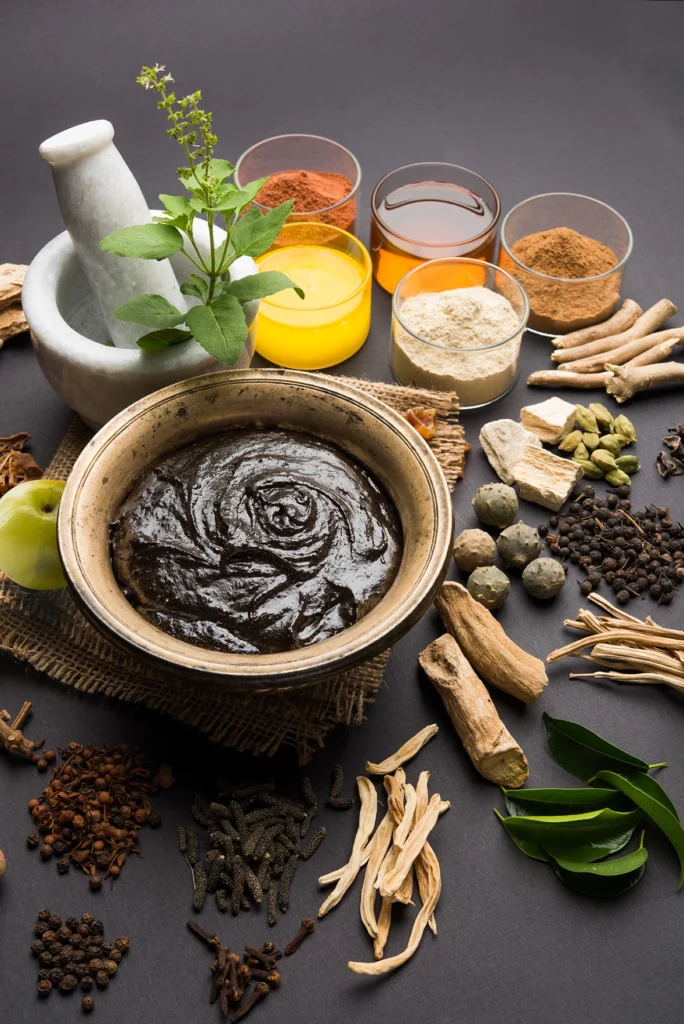Psoriasis, which affects millions worldwide, is known for its unpredictable course, psychological burden, and significant impact on the quality of life. While modern day interventions have a range of treatment options to manage its symptoms including biologics addressing some specific inflammatory channels, challenges such as recurrence, side effects, high costs, poor accessibility, contradictions with common comorbidities, limited efficacy in addressing the underlying causes have prompted interest in alternative approaches. Ayurveda offers a unique perspective on managing psoriasis through its concept of Rasayana, or rejuvenation therapy, with its role in alleviating symptoms, improving quality of life, and promoting overall health.
Ayurveda’s Unique Approach: What is Rasayana?
Rasayana, derived from the Sanskrit words “Rasa” (essence) and “Ayana” (path), refers to ‘clearing and promoting the optimum functioning of the essence of life’. These are the therapies aimed at rejuvenation and promoting longevity. One of the eight branches of Ayurveda, Rasayana encompasses dietary, lifestyle, and medical interventions designed to rebalance immunity, improve vitality, and promote overall well-being. By improving the quality of ‘dhatu’ (building blocks of the body), Rasayana therapies address both prevention and treatment of diseases.
Types of Rasayana
Rasayana is broadly categorized into:
Naimittika, which are disease-specific
Kamya Rasayana, that Enhances specific attributes like memory and longevity
Ajasrika Rasayana, focusing on daily practices for health maintenance
Achara Rasayana, emphasising ethical behavior, mental health, and lifestyle practices.
Mechanisms of Action
The basic concept of rasayana is to open up all the physiological channels of the body to ease and optimize the normal transport and metabolism. Rasayana therapies work through multiple mechanisms not yet understood fully in the perspective of modern understanding. Few of the possible mechanisms may be:
Antioxidant Action: Neutralizing oxidative stress, which is a key factor in chronic inflammatory conditions.
Immunomodulation: Enhancing the immune system’s ability to resist infections and autoimmune triggers.
Regeneration: Promoting cellular repair and tissue regeneration.
Adaptogenic Properties: Reducing stress and improving resilience.
How Does Rasayana Work in Psoriasis?
Rasayana therapies may address the multifaceted nature of psoriasis by reducing inflammation and regulating immune responses, improving skin health and alleviating symptoms like scaling, redness, and itching, Enhancing psychological well-being and reducing stress, promoting long-term remission without adverse effects.
In Ayurvedic practice, Rasayana is always combined with Shodhana or panchakarma (purification therapies). These therapies detoxify the body and prepare it to absorb the benefits of Rasayana, leading to more effective and sustainable outcomes.
Key Rasayana Herbs for Psoriasis
There are many specific herbs potent to be acting as Rasayana in cases of psoriasis. These are a few among many.
1. Bakuchi (Psoralea corylifolia)
Bakuchi, known for its anti-inflammatory, antimicrobial, and antiproliferative properties, has been extensively used in traditional medicine for skin conditions. It Contains bakuchiol, a compound that reduces inflammation and inhibits excessive skin cell proliferation. It is also rich in psoralen, a photoactive compound effective in UV-based therapies. Bakuchiol is gaining attention in dermatology as a natural alternative to retinoids, suitable for sensitive skin.
Ayurveda utilises it both externally and internally is psoriasis and other skin conditions like leucoderma.
2. Bhallataka (Semecarpus anacardium)
Bhallataka is traditionally valued for its anti-inflammatory and immune-boosting properties. Studies report marked improvement and remission in a majority of patients via controlled oral and topical application. The herb should be used strictly under medical supervision as it can cause various allergic and toxic responses when improperly used.
3. Tuvaraka (Hydnocarpus laurifolia)
Tuvaraka taila, derived from the seeds of Hydnocarpus laurifolia, is a potent Ayurvedic remedy for severe skin diseases and diabetes when used very carefully. It initiates strong vomiting and diarrhea during the specific rasayana method but helps in remission of the disease activity. It requires careful use due to its intense properties, necessitating standardization and controlled application. Along with complete symptomatic reversal, studies have demonstrated positive histological changes after the rasayana therapy..
Who can undergo Rasayana
The primary hurdle in the application of rasayana therapy is the time consumption. It requires proper planning and a well designed pancha karma as a must prerequisite. It will consume about 25 to 35 days for a proper course of psoriasis specific rasayana. The perfect candidates eligible for rasayana are to be rightly selected to provide better results. A well informed patient with complete support and readiness to follow dietary and lifestyle restrictions the rasayana demands will surely benefit from the procedure.
Rasayana therapy is not for everyone. It is best suited for individuals who
are in a stable phase of the disease (not during acute flare-ups).
are physically fit to undergo detoxification procedures.
are mentally prepared and committed to dietary and lifestyle recommendations.
can stay under supervision for a 3–5 week period.
Final Thoughts
Rasayana offers hope for those seeking a natural, holistic, and long-term approach to psoriasis. While it requires time, discipline, and professional guidance, the benefits can be deeply transformative – not just for the skin, but for overall health and well-being.
Dr.Jishnu Narayanan MD(Ay)
Associate professor and Head, Dep of Agadatantra
Clinical expert, Ayurveda Dermatology,
ASHA centre for Integrative Dermatology
Ashtamgam Ayurveda


